The King Edward VII is affectionately known as the ‘King Teddy’. It was built in 1905 by Mitchells & Butlers and was named after Edward VII’s visit to Gloucester in 1904. The license was probably transferred from the Globe Inn that was located on the other side of the Old Cheltenham Road.
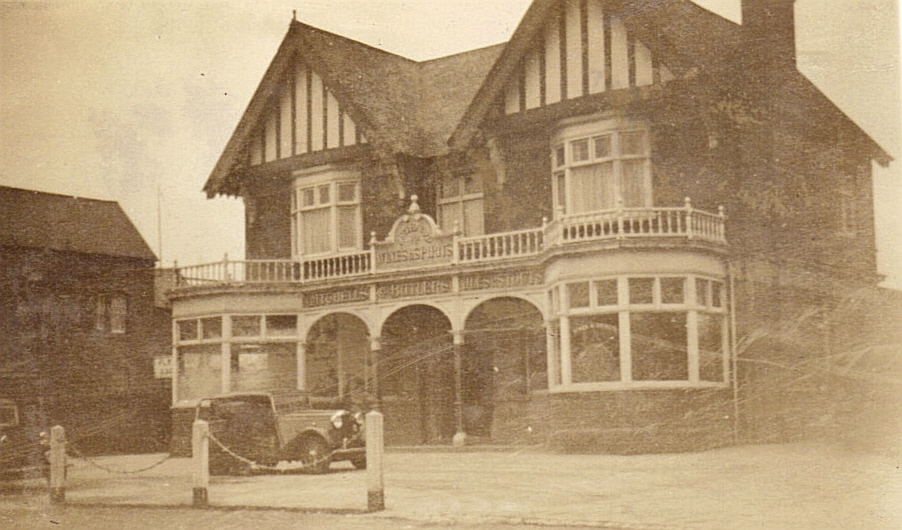
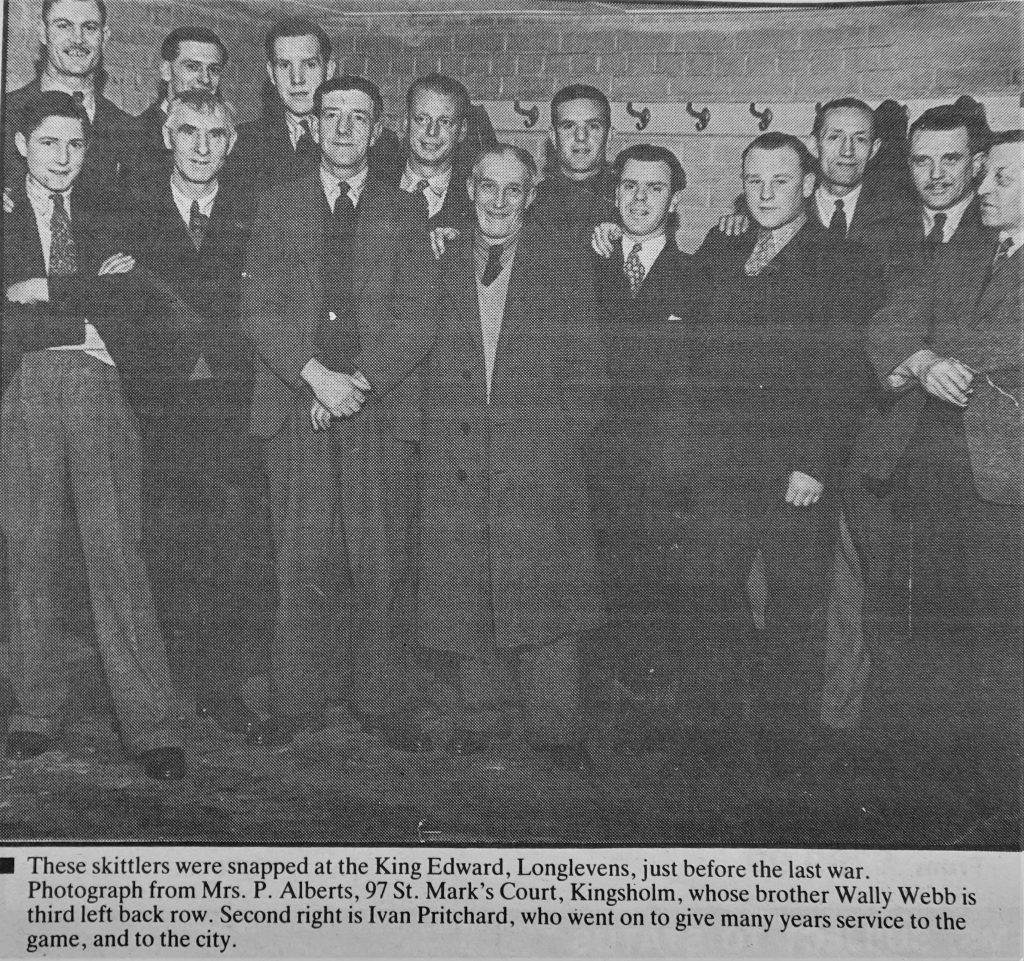
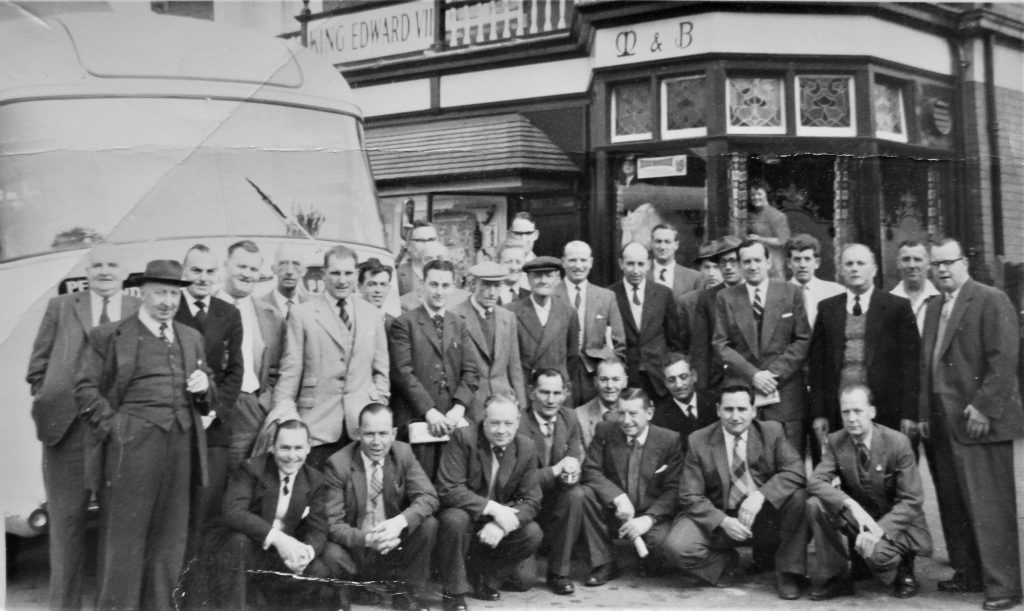
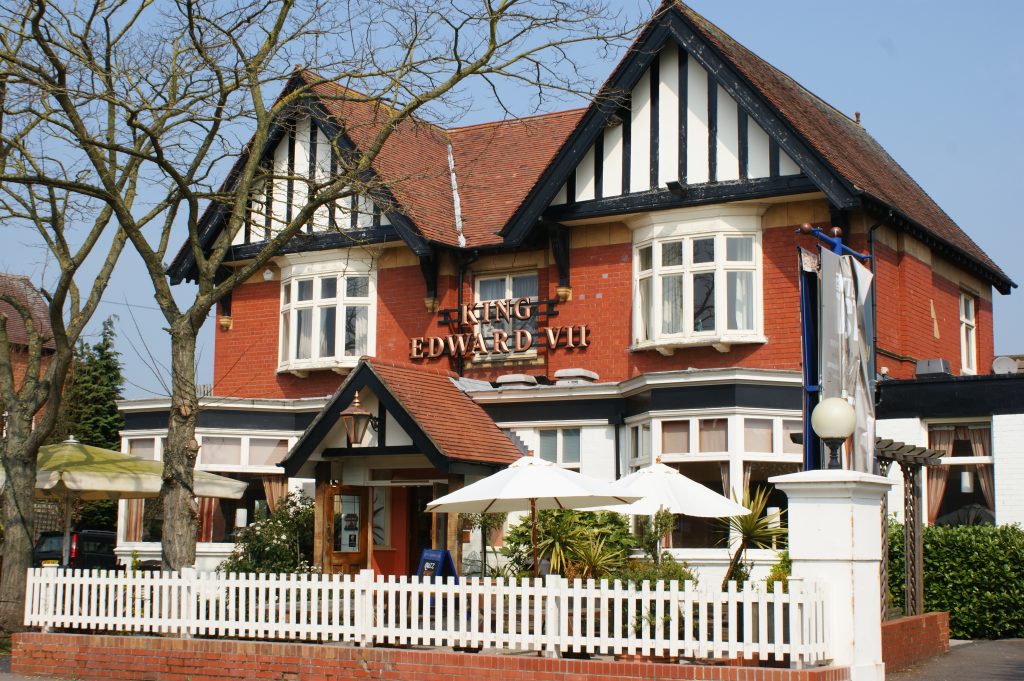
Bass, the owners of the ‘King Teddy’, re-opened the pub in December 1985 after major alterations and a complete refurbishment. A series of extensions that had been built since 1970 were deemed unfit for purpose and the opportunity was taken to demolish them in order to redesign the pub. The new-look bar, known as the ‘Teddy’, provided skittles and pool facilities to complement the darts, cards and shove ha’penny that had been enjoyed previously. The ‘Langtry’ lounge was created in Edwardian style with separate areas reflecting different aspects of life at the beginning of the 20th century. The facelift was sensitively done without any sacrifice to its traditional character. In addition a new beer cellar was added, together with new toilets including facilities for the disabled.
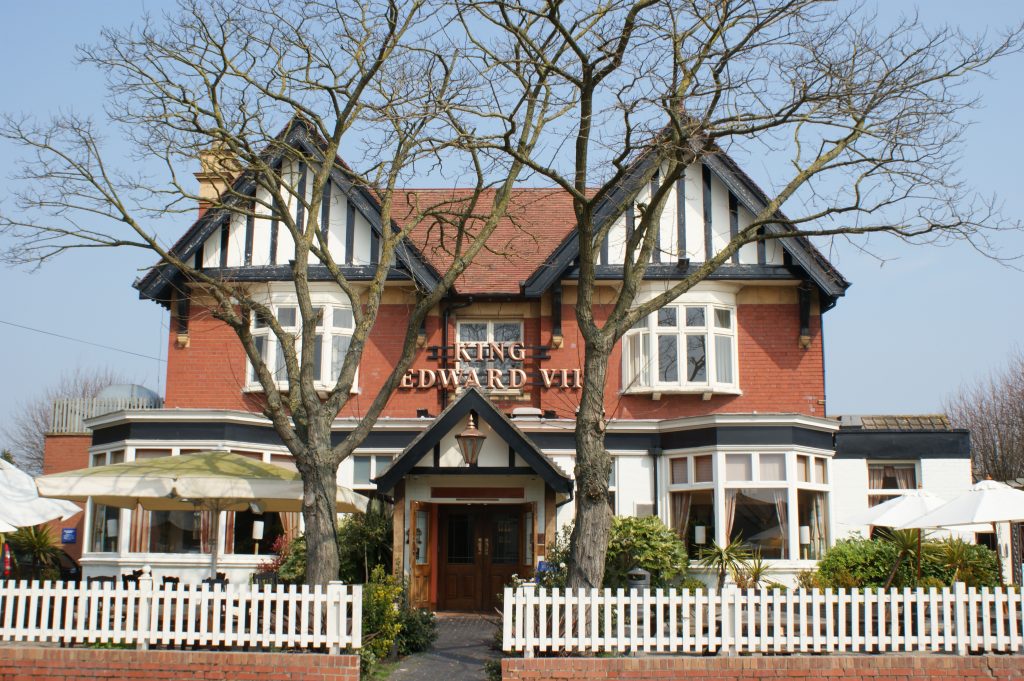
The King Edward VII opened as an Ember Inns pub in December 2001 after a £500,000 refit.
The pub suffered from flash flooding in the downpour of July 20th 2007 and was closed until September of that year.
Landlords at the King Edward VII include:
1919,1936 Mrs Eliza Pollard
1939,1957 Albert Thomas Marriott
1974 Bert & Edna Pollard (he was landlord for27 years at the King Teddy.)
1985 Frank & Tina Walsh (from the Roundabout in Bristol Road)
1997,1999 Bruce Sedgwick
2002,2005 Christopher Foster
2006 Chris Stone
2007 Tom Spittle
The following comprehensive notes are courtesy Steve Maidment. Reproduced with permission.
KING EDWARD VII, LONGLEVENS
The Gloucester Journal newspaper of 7 September 1901 reported on an application to build the King Edward VII; “To the Overseers of the Poor of the Parish of Wotton St Mary Without, in the County of Gloucester, and to the Superintendent of Police of the District of the Gloucester Petty Sessional Division, and to all others whom it may concern. I, Ralph Mitchell, now residing at Little Woodcote, Kenilworth, in the County of Warwick, Secretary to Messrs Mitchells and Butlers, Limited, of Cape Hill Brewery, Smethwick, in the County of Stafford, Brewers and Wine and Spirit Merchants, Do Hereby Give You Notice that it is my intention to apply at the adjourned General Annual Licensing meeting for the Division of Gloucester to be held at the Petty Sessional Court House, Shire Hall, Gloucester, on Saturday the 28th day of September, 1901, at the hour of 12 o’clock, noon, for a provisional grant of a license to sell by retail Wine, Spirits, Ale, Beer, Stout and Cider to be drunk or consumed either on or off a certain house and premises intended to be erected upon a piece of land containing by admeasurements 2228 square yards or thereabouts, situate opposite to the Globe Inn, Cheltenham Road, Longlevens, in the Parish of Wotton St Mary Without in the said County, having a frontage of 114 feet or thereabouts to Cheltenham Road aforesaid, and bounded on or towards the West by land of Elizabeth S Sullivan, on or towards the North by land of Frederick Charles Allen, on or towards the East by a house and land of Arthur Morris, and on or towards the South by the said Road, and which piece of land belongs to the said Messrs, Mitchells and Butlers and is in their occupation. Given under my hand this 4th day of September, 1901. Ralph Mitchell”.
The Gloucestershire Chronicle newspaper of 5 October 1901 reported from the Gloucester County Brewster Sessions; “Mr A C Champney (Messrs Champney and Long) applied on behalf of Messrs Mitchell and Butler, brewers, of Birmingham, for a provisional license for new premises they propose to erect at Longlevens, opposite the Globe Inn, and of which they are the owners. It was proposed to substitute the new premises for the Globe Inn. The latter was a very ancient beerhouse, being in existence prior to 1869, which should be of particular bearing with reference to the renewal or refusal to renew a public house license, and which could only be refused by magistrates on limited grounds and not on general ground. He produced plans showing the extent of the new premises, which he said would be a great improvement, as the premises were small and undesirable for a public house. Applicants could have built on the present site but they could not by so doing, give the advantages they could by acquiring the site on the opposite side of the road. The Globe was largely frequented by persons travelling from Gloucester and Cheltenham, and vehicles were constantly drawn up outside, which was a distinct inconvenience. One of the great advantages of the new site was that the house would be set back 30 feet from the road, so that people would be able to pull off the side without interfering with the traffic. The neighbourhood had in the last few years make remarkable advances, while it was still rapidly increasing, and there were 119 dwelling houses within a short distance of The Globe. Again, the Wotton Court Estate was rapidly developing. The nearest public house towards Gloucester was the Fleece at Wotton, which was about a mile away, and towards Cheltenham the Hare and Hounds Inn, about two miles away. This, Mr Champney contended, was a reasonable argument for a good house in the district, and it was desirable that the existing premises should give place to more modern and more convenient buildings. The accommodation would consist of the same number of rooms, but would be more convenient; in fact the premises would be larger and considerably better, and there would be a bar and a smoke room. This would be a distinct advantage to the public generally, while there would be separate access to the bar for those fetching beer. He concluded by asking the Bench to grant a full license, and said the applicants would lose the valuable asset of an ancient beerhouse. The service of the necessary notices having been proved Mr Henry William Chatters, architect, of Cheltenham, spoke to the plans which were handed in, and remarked that the rebuilding on the old site could not give the space in front for the convenience of the public. Replying to a question he said the new buildings would cost about £2000, and would take about ten months to erect. Mr Philpott, DCC, spoke in favour of the application and said there were 119 houses within half a mile of the proposed new premises, and putting the average at five persons to a house it would make nearly 600. He was greatly in favour of the new building because it would do away with the old beerhouse. He however hoped the justice would not allow it to come into existence without satisfying themselves that everything had been properly carried out. It would not increase the number of houses in the district. Mr Priday: You think a fully licensed house less objectionable than a beer-house ? Mr Philpott : I do, because the owners have more at stake, and they were better conducted. He added that it was a rapidly increasing suburb of the city. The Bench retired to consider their decision, and after an absence of about ten minutes returned into Court, when the Chairman said they were of opinion that the application should not be granted. The announcement caused considerable surprise in Court”.
The Gloucester Journal newspaper of 17 January 1903 printed an announcement; “To the Overseers of the Poor of the Parish of Wotton St Mary Without, in the County of Gloucester, and to the Superintendent of Police and the Clerk to the Justices of the District of the Gloucester Petty Sessional Division, and to all others whom it may concern. I, John Edwin Mitchell, now residing at Cape Hill, Smethwick, in the County of Stafford, Secretary to Messrs Mitchells and Butlers, Limited, of Cape Hill Brewery, Smethwick, aforesaid, Brewers and Wine and Spirit Merchants, do hereby give you Notice that it is my intention to apply at the General Annual Licensing Meeting for the Division of Gloucester, to be holden at the Petty Sessional Court House, Shire Hall, Gloucester, on Saturday, the 7th day of February, 1903, at the hour of 12 o’clock noon, for a Provisional Order sanctioning the removal of a license now in force and held by William Short, for the sale by retail of Beer to be drunk or consumed either on or off certain premises situate at Longlevens, in the parish of Wotton St Mary Without, in the County of Gloucester, and known by the name of the Globe Inn, from the said premises to a certain house and premises intended to be erected upon a piece of land, containing by admeasurement 2228 square yards or thereabouts, situate opposite to the Globe Inn, Cheltenham Road, Longlevens, in the Parish of Wotton St Mary Without in the said County, having a frontage of 114 feet or thereabouts to Cheltenham Road aforesaid, and bounded on or towards the West by land of Elizabeth S Sullivan, on or towards the North by land of Frederick Charles Allen, on or towards the East by a house and land of Frank Beard, and on or towards the South by the said Road, and which piece of land belongs to the said Messrs, Mitchells and Butlers Limited, and is in their occupation, of which license, when removed, I desire the said William Short to be the holder. Given under my hand this 15th day of January, 1903. J Edwin Mitchell”.
The Gloucestershire Chronicle newspaper of 14 February 1903 reported from the Annual Licensing Sessions of Gloucestershire; “The Deputy Chief Constable (Mr W Harrison) read the following report … ‘I have received notice from John E Mitchell, secretary to Messrs Mitchell and Butler, Limited, Smethwick brewers, of his intention to apply for a provisional order sanctioning the removal of a license now in force for the sale by retail of beer for the consumption on the premises, situated at Longlevens, in the parish of Wotton St Mary Without, and known by the name of the Globe Inn, to a site where it is intended to erect premises opposite to the said Globe Inn, on the Cheltenham Road’. … Mr A C Champney appeared in support of Messrs Mitchell’s application. He said last year the Bench refused the application for a full license. His clients, however, so keenly felt the necessity of the removal that they did not ask for that additional privilege. The transfer would effect a great improvement in the locality. A suitable building would be erected, and the road would be considerably widened. Evidence as to service of notices &c having been given, the Chairman announced that the magistrates had decided to accede to the application”.
The Gloucester Journal newspaper of 10 February 1906 reported from the local Brewster Sessions where it was announced that amongst licenses that had been transferred in the previous year was the King Edward VII.
The Citizen newspaper of 3 March 1906 reported from the Gloucester County Licensing meeting; ”The only business was the hearing of an application made by Mr A C Champney on behalf of Francis Wm Robbins, of the King Edward VII Inn, Longlevens, for the removal of the full license of the Kings Head, at The Flat, to the King Edward VII, which is at present a beerhouse. Mr Champney said it would be within the recollection of the Bench that two years ago he applied for the removal of the old license of the Globe at Longlevens, which was an ante-1869 beerhouse, to the premises which Messrs Mitchell and Butler then proposed to build on the opposite side of the road. Those premises were duly erected, and were known as the King Edward VII Inn, and this present application was that the full license the Kings Head at The Flat should be removed to this house, the effect of which would be that the licenses in the division would be reduced by one. Longlevens was a growing district, and a full license would be a great convenience to residents, and also to visitors in the summer time. Mr Champney proved the consent of Messrs Arnold, Perrett and Co, owners of the freehold of the Kings Head, and of the other parties concerned. There was no opposition. The Deputy Chief Constable (Mr W Harrison) said he thought under the circumstances it would be a very good thing, and the Chairman, in announcing the decision of the Bench to accede to the application, said he thought it was a very proper thing to have. It was arranged that the alteration should date from the 5th of April”.
The Citizen newspaper of 14 May 1906 published an account of the Association for Restricting the Sale of Intoxicants, Annual Report; “An application of a similar kind was made to the County Bench for a license for the King Edward VII beerhouse at Longlevens (beyond the city boundary), to which it was proposed to remove the wine and spirit license from a small fully-licensed house at Westbury on Severn, closing the latter altogether. Neither the police nor any other person or society opposed this arrangement, which was granted by the Gloucester District (County) Bench, but was refused to be confirmed by the County Confirmation Committee, and consequently the proposal lapsed”.
The Gloucester Journal newspaper of 14 March 1908 reported from the annual licensing meeting for the Gloucester County Petty Sessional Division; “Mr C Vachell KC, with whom was Mr Graham Millward (acting on instructions from Mr A C Champney) applied on behalf of Howard Walters, the licensee of the King Edward VII (beerhouse), Longlevens, in the parish of Wotton St Mary (Without) for the removal to that house of an alehouse license now in force and held by Henry Cooper in respect of premises known as the Kings Head, at the Flat, Westbury on Severn. – Mr Frank Treasure opposed on behalf of the Rev Charles Davis, Incumbent of Holy Trinity Church, Longlevens, and others. Mr Vachell, in making the application, said it was made under Section 50 of the Licensing Act of 1872, which provided that licenses might be removed from one part of a licensing district to another part of the same licensing district, or from one licensing district to another licensing district in the same county”. … “The owners of this license of the Kings Head were Messrs Arnold, Perrett and Co and the owners of the King Edward VII were Messrs Mitchells and Butlers, both well-known brewery firms. Messrs Mitchells and Butlers had entered into an agreement with Messrs Arnold, Perrett and Co for the provisional purchase of this license. They gave them £75 for the option of purchasing. If they did not purchase they would lose this £75, but if they got permission for the removal of the license they would purchase it for £925 in addition to the £75. If they got this license granted and confirmed, then they would pay £1000 for it”. … “The Parish of Wotton St Mary had an estimated population of 906, and there were only two on licenses. In the adjacent parish of Barnwood there was an estimated population of 1,184 and there was no on license”. … “The Bench retired to consider their decision and on returning to the Court the Chairman said : We cannot grant this license as now presented to us. If a new application is made (meaning an application for a new license) we will consider it”.
The Gloucestershire Chronicle newspaper of 16 May 1908 reported from the Gloucester Central Association for Restricting the Sale of Intoxicants; “… the King Edward VII beerhouse at Longlevens. This was [an application] for a removal of the full license of The Kings Head, The Flat, Westbury on Severn parish, to the beerhouse named. Our Committee felt it their duty to oppose this proposal, and engaged Mr Langley-Smith to conduct the opposition. He was, however, suddenly called away to the Continent, and in consequence Mr Frank Treasure was, at a short notice, engaged on our behalf, while the applicants employed the City Recorder (Mr Vachell KC) and Mr Graham Millward, a Birmingham barrister, instructed by Mr A C Champney. The Rev C Davis, the incumbent of Longlevens Church, appeared to give evidence in opposition to the application, and his churchwardens and other influential inhabitants sent a memorial against it. Mr W Sisson, whose new works are near the spot, also opposed in person. After long deliberation the Bench decided to refuse the application. It will be remembered that a similar application was made two years before, in regard to the removal of the full license from The Bird in Hand, at The Flat, Westbury, to this same beerhouse. This was granted by the local Bench, but confirmation of the grant was refused by the County Licensing Committee. A provision in the new Licensing Bill proposes to abolish this system of removals of licenses”.
The Gloucester Journal newspaper of 22 July 1911 reported; “A pleasant evening was spent at the King Edward, Longlevens, on Tuesday, when a company of 30 from the Windmill Hotel sat down to a supper provided by the hostess, Mrs Pollard”.
The Citizen newspaper of 22 February 1921 reported that; “I, Eliza Pollard, now residing at the King Edward VII Inn, Longlevens, near the City but in the County of Gloucester, Beerhouse Keeper, do hereby give notice that it is my intention to apply the adjourned General Annual Licensing Meeting, to be holden at the Petty Sessional Court House, Bearland, in the City of Gloucester, on the 12th day of March next, for the grant to me of a Justices License authorising me to apply for and hold an Excise License to sell by retail at premises situate and known as The King Edward VII Inn, Longlevens, aforesaid, any intoxicating liquor which may be sold under a Spirit Retailers (or Publicans) License for consumption either on or off the said premises, of which premises Mitchells & Butlers Limited , whose Registered Office is at Cape Hill Brewery, in the City of Birmingham, are the owners, and for I am the Manageress, and of which Justices License when granted I desire to be the holder. Given under my hand this 17th day of February, one thousand nine hundred and twenty-one”.
The Citizen newspaper of 11 March 1922 reported from the Gloucester County Licensing Sessions; “ The only licensing business was an application for the transfer of the full license of The Jolly Waterman, Longford, to the on-licensed beerhouse known as The King Edward VII, Longlevens. Mr Graham Millward (instructed by Mr A Lionel Lane) appeared in support of the application. The application, he said, so far as the request for a full license for The King Edward VII was concerned had been made on previous occasions, but never in the form in which it was being made that day. On paper the net result of the application, if granted, would be that one on-beerhouse would remain, but in point of fact the actual result would be that the license of The Jolly Waterman would go entirely, and the King Edward VII would become fully licensed to sell wines and spirits. The nearest licensed premises to the King Edward VII were the Cross Keys 1,438 yards away, The Fleece 1,600 yards distant, and the Hare and Hounds 2,400 yards away. Mr C France Drinkwater opposed the application on behalf of the Central Association for restricting the sale of intoxicants, Messrs W Sisson and Co Ltd, and a number of residents in the locality. Mr Milward, continuing his opening statement, mentioned that the licensee of the King Edward VII (Mrs Eliza Pollard) was a person of excellent character and proceeding argued that while there was unfortunately some opposition to the application, the magistrates in arriving at their decision had to consider the feelings of the neighbourhood as a whole. Mr Frank Pollard, the son of the licensee, had canvassed 149 houses, in some of which two families were living, and had secured the signatures of 159 heads of families, nine of whom were total abstainers, to a petition requesting the magistrates to grant a full license. Evidence in support of the application was then called, and it was to the effect that the license was very much needed, and that it would not be detrimental to the morale of the parish. Mr D C C Hopkins said he had known Mrs Pollard for many years. She had given every satisfaction as a licensee and in his opinion was quite capable of carrying on a fully-licensed house. Witness had previously opposed the application but with the prospect of the closing of The Jolly Waterman, which he would be glad to see shut up, he now supported it. Replying to Mr Turner, he said he thought, on the basis of the petition, that the full license was necessary. Mr Drinkwater pointed out that the application had been persistently opposed and refused since 1906 and argued that if it were granted that day the magistrates would be going back on their decisions of 1920 and 1921 when they did not think a full license necessary. It was extraordinary, he said, that for three years running the same application should be made with any thought that the magistrates might come to a different conclusion having regard to the fact that the legislation, , by the Act of last year, had embarked upon a definite policy of restricting facilities for the sale of intoxicants. Mr Drinkwater submitted that there had been no evidence adduced and no change of circumstances to warrant the granting of the application. Mr Drinkwater proceeded to call evidence in the course of which it was stated that the petition opposing the application had been signed by about 70 residents of the locality. The justices retired and on returning into Court the Chairman said they had carefully considered the application and on the ground that The Jolly Waterman would cease to be a licensed house they had decided, by a majority, to grant the transfer of the full license to The King Edward VII Inn at Longlevens”.
The Citizen newspaper of 2 June 1922 made an announcement; “J Colwick – The Jolly Waterman, Walham, is to be opened at tea rooms. Minerals and cigarettes sold”.
OS 25inch 3rd Edition, 1898-1939 map shows the newly erected King Edward VII but annotates it as a Beer House (BH). On the south side of (Old) Cheltenham Road, opposite the King Edward VII, the property that was once The Globe Inn is no longer marked as being a Beer House.

OS 25’ Revised Edition, 1921-1943 map shows the King Edward VII which is now annotated as being a Public House (PH)

POLLARD FAMILY
In 1947 Albert Pollard married Edna G Andrews at Worcester. Had a son David Albert in 1949 and a daughter Kathleen E in 1951. Edna had been born in 1924 at Worcester, daughter of Ernest J Andrews and Mary McKeon.
POLLARD David Albert (Dave) Passed away suddenly on Monday 6th February 2017 aged 67 years. A dear friend to Julianne, much loved brother to Kate, uncle to David, Richard and Sara, great Uncle to Lexi, Toby and Sam and dearly loved by Joanne, Andrew, Dave and Agnes. The funeral service will take place at Gloucester Crematorium on Tuesday 7th March 2017 at 12.00. No flowers by request, donations if desired for The British Heart Foundation may be sent c/o B Sweet & Sons Funeral Directors 12a Oldbury Road, Tewkesbury, GL20 5LZ.
In 1911 Eliza Pollard, a widow, living with family in a 7 room property at 174 Barton Street, Gloucester, Vauxhall Inn, employed as a hotel manageress. Her children; Frank Hubert (1893), Dorothea May (1892), Elsie Winifred (1895), Myra May (1897), Norah (1901) and Ronald (1903). She had had 8 children and 6 were still alive. Eldest son Frank was employed as a hotel clerk. Eliza had been born at Topsham, Devon, in 1863, the first four children named were born at Liverpool and the last two at Gloucester suggesting they arrived here in 1901.
In 1901 the family were living at Weston Road, Gloucester with father George J D employed as a hotel manager. George was also born at Topsham, Devon, in 1864. Children included an elder son Victor, born at Liverpool in 1887. Both father George James Dunn and son Victor George P Pollard died in 1906 at Gloucester.
The Vauxhall Inn was built in 1876 by Mitchells and Butlers.
George James D Pollard married Eliza Pym at Fulham in 1886.
In 1881 father George was single and living with his parents George and Eliza, both from Topsham, and family were living at South Chester Street, Toxteth Park, Liverpool, with father George employed as a dock gateman and son George as a ships steward.
Judging by the places of birth of the children, the family left Topsham for Liverpool in approximately 1871.
In 1871 George was living with his parents at Topsham where he was a scholar.

